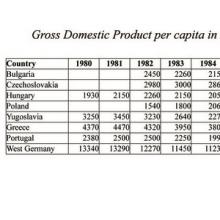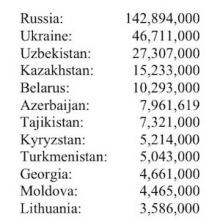Politics

Long Teaching Module: Economies in Transition in Eastern Europe, 1970-1990
It is well known that the East European Communist governments were unable to provide their citizens with a standard of living comparable to that of the West.

Long Teaching Module: Nationalities and the Breakup of the Soviet Union, 1989-2000
The Soviet Union was a multi-national empire from the revolution of 1917 through the final demise of Communism in 1991.
Warsaw Embassy Cable, Bronislaw Geremek Explains Next Steps Toward a Solidarity Government
Following the historic semi-free elections in Poland in June 1989, which resulted in a near total defeat of the Communist regime, Polish Communist and Solidarity leaders engaged in ongoing and significant negotiations in the hope of establishing stability in Poland.
Czechoslovak Secret Police Memorandum, "Information Regarding the Situation in the CSSR"
As a result of the intensifying public demonstrations in the first half of 1989, the Czechoslovak Communist Party increased its surveillance and suppression of independent and opposition groups, particularly in anticipation of politically-charged anniversaries.
Czechoslovak Secret Police Memorandum, "Information on the Security Situation . . "
This Secret Police (StB) memorandum from 21 August details the plans of independent and opposition groups to commemorate the politically-sensitive anniversary of the 1968 Warsaw Pact invasion, and the police's "extraordinary security measures" to prevent the commemorations from taking place.
U.S. Reaction to a New Prime Minister in Poland
In early June 1989, Poland held its first semi-free elections since the inception of Communist Party rule in the post-World War II era. The elections resulted in a solid defeat of Communism and a sound victory for the Solidarity opposition.
Transcript of the SED Politburo Session held on 5 September 1989 East Germany
Hungary began dismantling the barbed wire along its border with Austria in May, 1989. Over the summer months, thousands of East Germans risked their lives crossing over the Hungarian-Austrian border before heading north to West Germany.
Letter from GDR Ambassador to Hungary, Gerd Vehres, to Foreign Minister Osker Fischer
Hungary began dismantling the barbed wire along its border with Austria in May, 1989. Over the summer months, thousands of East Germans risked their lives crossing over the Hungarian-Austrian border before heading north to West Germany.
National Intelligence Council Memorandum, Status of Soviet Unilateral Withdrawals
In December 1988, Soviet leader Mikhail Gorbachev delivered what he called a “watershed” address at the United Nations, announcing that he planned unilaterally to reduce Soviet military forces by 500,000, cut conventional armaments massively, and withdraw substantial numbers of armaments and troo
Berlin Embassy Cable, The GDR Political Crisis: Still Deepening. October 4, 1989
On the eve of East Germany fortieth anniversary celebrations, it appeared that the SED was losing control. Several pressure points in society were mounting at the same time.